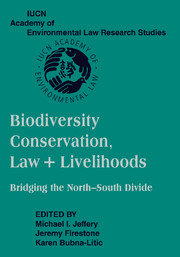 Biodiversity Conservation, Law and Livelihoods: Bridging the North-South Divide
Biodiversity Conservation, Law and Livelihoods: Bridging the North-South Divide Book contents
- Frontmatter
- Contents
- Acknowledgments
- Message from Kofi A. Annan, Secretary-General of the United Nations
- Macquarie Statement
- Contributors
- Introduction
- PART ONE THE CONTEXT
- 1 Environmental Law Forty Years Later: Looking Back and Looking Ahead
- 2 Biodiversity and International Law: Historical Perspectives and Present Challenges: Where Do We Come From, Where Are We Going?
- 3 Some Observations on the IUCN, the Earth Charter, and Global Governance
- 4 The Changing Role of Law in the Pursuit of Sustainability
- PART TWO BIODIVERSITY: ITS CONSERVATION
- PART THREE CONSERVATION MEASURES
- PART FOUR USES OF COMPONENTS OF BIODIVERSITY
- PART FIVE PROCESSES AFFECTING BIODIVERSITY
- PART SIX BIOSECURITY ISSUES
- PART SEVEN ACCESS AND BENEFIT-SHARING
- Index
4 - The Changing Role of Law in the Pursuit of Sustainability
Published online by Cambridge University Press: 31 July 2009
- Frontmatter
- Contents
- Acknowledgments
- Message from Kofi A. Annan, Secretary-General of the United Nations
- Macquarie Statement
- Contributors
- Introduction
- PART ONE THE CONTEXT
- 1 Environmental Law Forty Years Later: Looking Back and Looking Ahead
- 2 Biodiversity and International Law: Historical Perspectives and Present Challenges: Where Do We Come From, Where Are We Going?
- 3 Some Observations on the IUCN, the Earth Charter, and Global Governance
- 4 The Changing Role of Law in the Pursuit of Sustainability
- PART TWO BIODIVERSITY: ITS CONSERVATION
- PART THREE CONSERVATION MEASURES
- PART FOUR USES OF COMPONENTS OF BIODIVERSITY
- PART FIVE PROCESSES AFFECTING BIODIVERSITY
- PART SIX BIOSECURITY ISSUES
- PART SEVEN ACCESS AND BENEFIT-SHARING
- Index
Summary
I begin with a claim that is to me self-evident, but that does not seem to reflect legal scholarship: Law is a behavioural discipline. Its function is to shape how people act. It shares this with economics, marketing, political science, and psychology (to name but a few). Although the literature of the law is populated with examples of weird, wonderful, and frightening aspects of behaviour, legal mainstream legal literature rarely discusses the causes of (or strategies to alter) behaviour, perhaps with the exception of some arguments about the deterrent value of punishment (particularly the death penalty). The focus of that literature is legal instruments and legal interpretation. It contains very little enlightenment about the behavioural effectiveness of law, or the strategies through which desired outcomes could be more efficiently achieved. Neither legal practice nor legal theory are engaged in a scientific discourse about the mechanisms through which (for example) punishment (or the fear of it) works, its limits, or the ways in which public information about rules or judgments impacts within the general community to shape hopes, fears, and resultant behaviour. The idea that one might trade off policing investment for education, or manage transaction costs better to allow for more effective use of resources, is a discussion that is largely foreign to the mainstream legal literature.
Which leads me to the more challenging statement: Law is a behavioural discipline, sadly bereft of a behavioural theory.
- Type
- Chapter
- Information
- Biodiversity Conservation, Law and Livelihoods: Bridging the North-South DivideIUCN Academy of Environmental Law Research Studies, pp. 49 - 66Publisher: Cambridge University PressPrint publication year: 2008


